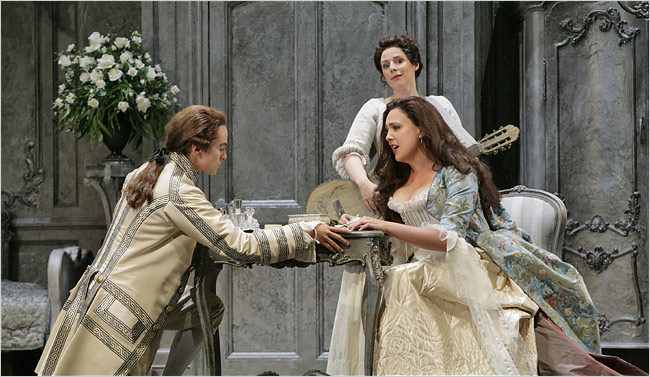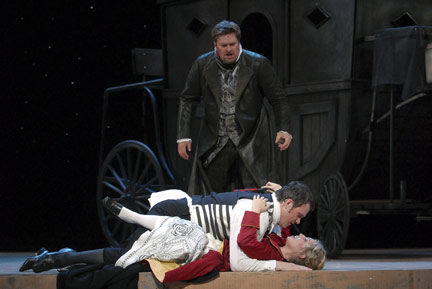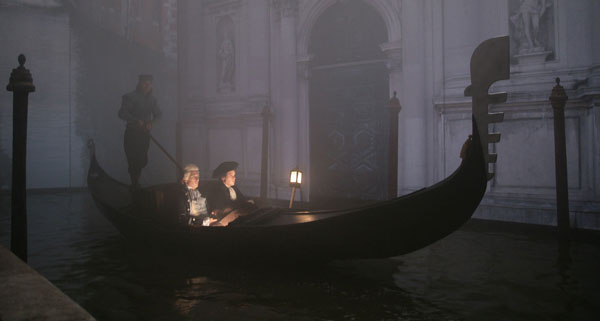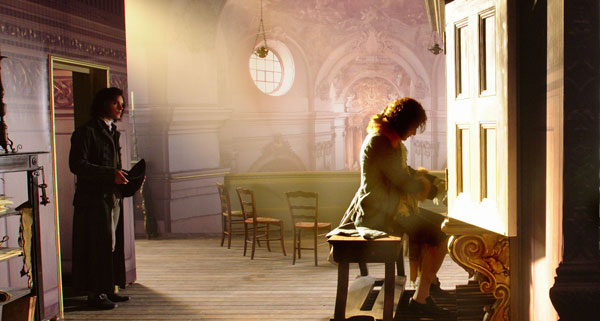The twenty somethings. The Generation Y of his time. The Harry Potter infected mania of the Hapsburgs and the first faint scent of a nostalgic return. Wolfgang Amadeus “Quidditch of Music” Mozart. His patience finally snapped when he was made to sit at the valet’s table during one of the archbishop’s state visits to Vienna.” Salzburg is no place for my talent. In the first place professional musicians there are not held in much consideration; and, secondly one hears nothing, there is no theatre, no opera; and even if they really wanted one, who is there to sing?” ( Mozart ) Mozart had no idea that he was destined to go down in the pages of history as a Great Man.

The Marriage of Figaro. From left, Isabel Leonard as Cherubino, Elizabeth Watts (with guitar) and Susanna Phillips in “The Marriage of Figaro.”
From then on Mozart lived in Vienna as a free lance, giving concerts and piano lessons, accompanying singers and composing music on commission. He might have fared quite well had he not promptly fallen in love. At twenty-five he suddenly felt a pressing need for matrimony. ”…owing to my disposition , which is more inclined to a peaceful and domestic existence than to revelry, I who from my youth up have never been accustomed to look after my own belongings, linen, clothes and so forth, cannot think of anything more necessary to me than a wife… I am absolutely convinced that I should manage better with a wife on the same income which I have now than I do by myself. And how many useless expenses would be avoided! ….A bachelor, in my opinion, is only half alive.
His choice was Constance Weber. Most biographers depict her as a liability that Mozart could ill afford. She was frivolous, thoughtless and unaware until years later that she was married to a genius. She was also a flirt, a schemer, and certainly no match for Mozart on any level but the bed. At any rate, Mozart seemed destined for a comfortable middle-class life. Famous last words.
It was during these years that Lorenzo Da Ponte came to Vienna, a poet disguised as an Abbe, and a baptized Jew from Venice. He was an accomplished libertine, humorist, humanist, court playwright to the emperor Joseph II, and probably the best opera librettist ever to set pen to paper. For the first and only time in his life, Mozart worked with texts that were worthy of his music. Da Ponte was essentially an intelligent hustler with street smarts, equally confident writing music as he was fencing stolen goods.
“The librettist for three of Mozart’s operas (Le nozze di Figaro, Don Giovanni, and Così fan tutte) was born in 1749, the son of a Jewish tanner, and was named Emanuele Conegliano…. When the boy was five, his mother died and the children ran wild; by the age of eleven he could scarcely read or write. When he was fourteen, his father, then forty, fell in love with a girl of sixteen. Since she was Roman Catholic, he had to convert in order to be able to marry her. Emanuele took the name of their sponsor, Bishop Lorenzo Da Ponte, and the boys were taken into the Bishop’s seminary. Although at the time he could barely write a decent Italian sentence, Lorenzo soon became fluent in Latin. Seminaries were to train young men for the priesthood. Latin was needed by priests, so seminaries taught Latin almost exclusively. Luckily one of the masters also encouraged the boys to study Dante, Petrarch and other Italian poets. This was the start for Da Ponte of a life-long love of Italian literature. To buy books he stole leather from his father and sold it to a shoemaker. When he was found out, instead of punishing him, the Bishop gave him money to buy more books. Soon, however, he had to sell his precious volumes and much of his clothing to help support his family. This was to become a recurring theme in his life, buying the books he loved, then selling them to pay his debts. At the age of twenty-one, Da Ponte was made a teacher at another seminary, and at twenty-four he was ordained as a priest. Almost immediately he set off for Venice. At the time, Venice had seven opera houses, and music was everywhere. It was also one of the most dissolute cities of Europe, and gambling was a second passion. The motto of the Venetians was, “A little Mass in the morning, a little gamble in the afternoon, and a little lady in the evening.” The carnival season lasted six months, during which all the people wore masks, even the priests.”
The first collaboration between the nightingale and the phoenix produced “The Marriage of Figaro” based on Beaumarchais‘s subversive play, which had been banned from the imperial stages but was now smuggled into the opera house by the back door; only slightly expurgated, yet all the more powerful as a piece of pre-revolutionary theatre. Da Ponte, took this popular play, sanitized the most provocative political content that would have offended the Viennese imperial censors, and faithfully translated the rest into Italian which was customary opera language of the day. With Mozart’s masterpiece of a score, the result was a witty yet profound tale of love, betrayal, and forgiveness. “Figaro” made a name for them not only in Vienna but also in Prague, where it scored an instant sensation.
In The Marriage of Figaro, Beaumarchais continued the story of the barber of Seville. The Count has married Rosine but their marriage has gone sour because of his philandering. Figaro has quit barbering a
s now the Count’s major-domo. He is engaged to Suzanne, who is Countess Rosine’s maid — and the Count’s intended conquest. Old Bartholo is back to seek revenge on Figaro for taking Rosine away from him, with the help of the slimy music-master, Don Bazile. Adding to the fun are an amorous teenager, a scheming old maid, a drunken gardener, and a silly young girl. Much happens on a single “folle journée” or a crazy day.
Czech critic Franz Nemecek: ” Never before had their been such overwhelming and unanimous ecstasy as his divine playing aroused. We truly did not know which we ought to admire the more, the extraordinary compositions or the extraordinary playing. Both together produced a total effect upon our souls which resembled a sweet enchantment”.
Riding the crest of their enthusiasm, Mozart was commissioned to write a new work for the Prague Opera. Apparently the idea of taking Don Juan as the subject stemmed from Da Ponte.In Venice, Da Ponte published scandalous sonnets, for which he was publicly denounced, dismissed from his teaching position, and forbidden to teach anywhere in the Venetian Republic. He was a follower of Rousseau and a friend to Casanova. He even lived in a brothel for a while and it was said that he could be seen there, entertaining the clientele by playing the violin, dressed in clerical garb: ” Da Ponte stayed on and had several affairs, including one with a married woman who bore him several children. As was the custom with illegitimate children, they were turned over to a foundling hospital. Through all of this he continued to say Mass regularly, and no one seemed to object. One of Da Ponte’s friends in Venice was Giovanni Casanova, whose name was to become, along with “Don Juan,” a synonym for a libertine. While Don Giovanni was based on other sources, Da Ponte’s life and that of his friend certainly enabled him to give verisimilitude to the opera’s title character. Finally, his indiscretions caught up with him, and he was banished from Venice for fifteen years. If found there, he was to be imprisoned in a dungeon without light for seven years.”
Da Ponte set to work on the libretto in great haste. As he notes in his memoirs, ” A beautiful sixteen year old girl whom i should have loved as my daughter only, but, lived in the same house with me, with her mother. She took care of the household and had permission to enter my room when I rang which I very often did, particularly when my inspiration began to cool off.” If the account is accurate, which is likely based on previous adventures, it would account for the lusty odor of sex and versimilitude that pervades the seduction scenes of Don Giovanni.
As for Mozart’s inspiration, it never cooled off. He seems to have had no inkling he had created a work that would like Hamlet, remain a source of perpetual fascination to people both inside the theatre and out of it. From the very first chords of the Overture, prophesying that the grave will spew up the ghost of the Stone Guest, the gates swing open on the romantic age, and on an entirely new conception of what could be expressed in art. It appears to be a morality tale about the consequences of a licentious life but Da Ponte evaded the issue by calling it a “cheerful drama”.
The coexistence of the saint and sinner, as poetry and in the same musical time space led to much interest among psychoanalysts like Otto Rank . Rank claimed Don Giovanni was heavily charged with symbolism and he related the opera to his book “In The Double” in which he explores the theme of the double in literature as a kind of shadow, reflection, portrait, twin, or even duplication of mental life resulting from amnesia or manipulation such as in Robert Louis Stevenson’s Dr. Jekyll and Mr. Hyde. Rank examined various possibilities, including the terrible consequences if the shadow is lost and the independent double persecutes the ego.Rank’s general thesis claimed that a hero’s misfortune follows from his disposition to narcissism, which turns him into the prisoner of his double. The double then becomes a rival in sexual love or appears in superstitious belief as a terrifying messenger of death, a devil, or an anti-ego, destroying rather than replacing the ego.
Mozart and Da Ponte created one further masterpiece together called Women Are All Like That, which completed the trilogy.Not surprisingly, Da Ponte gave himself credit for Mozart’s success: “Though gifted with talents superior perhaps, to those of any other composer in the world, past, present or future, Mozart has, thanks to the intrigues of his rivals, never been able to exercise his divine genius in Vienna, and was living there unknown and obscure, like a precious jewel buried in the bowels of the earth and hiding the refulgent excellence of its splendors. I can never remember without exultation and complacency, that it was to my perseverance and firmness alone that Europe and the world in great part owe the exquisite vocal compositions of the admirable genius.”
Emperor Joseph II’s death in 1790 left Da Ponte without a patron and he swiftly moved to London and worked as a librettist there before bankruptcy forced him to leave for New York. Sadly, his last years were spent in poverty and neglect and like Mozart, he too was buried in an unmarked and now forgotten grave. Da Ponte’s story of rakishness and retribution, poetry and pathos was in essence, the substance of a Mozart opera.













 COMMENTS
COMMENTS




Dave, I was recently on Strauss’s operetta “Bat”.
Certainly, Mozart is higher for me.
Bill, thanks for reading.
Great article, David!! Once again you never cease to amaze me
Great article,David!!Once again You never cease to amaze me
thanks !!!! it was a good article. lots of subtlety. I like Da Ponte and Mozart. Best, Dave